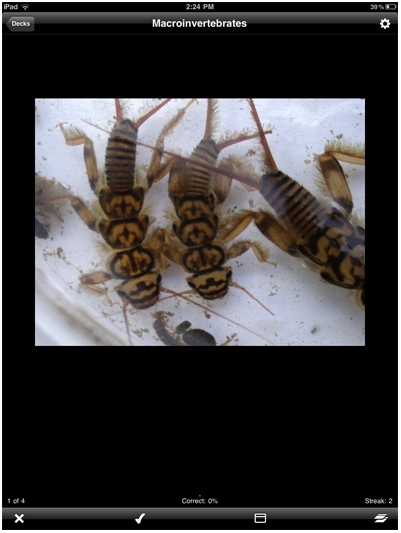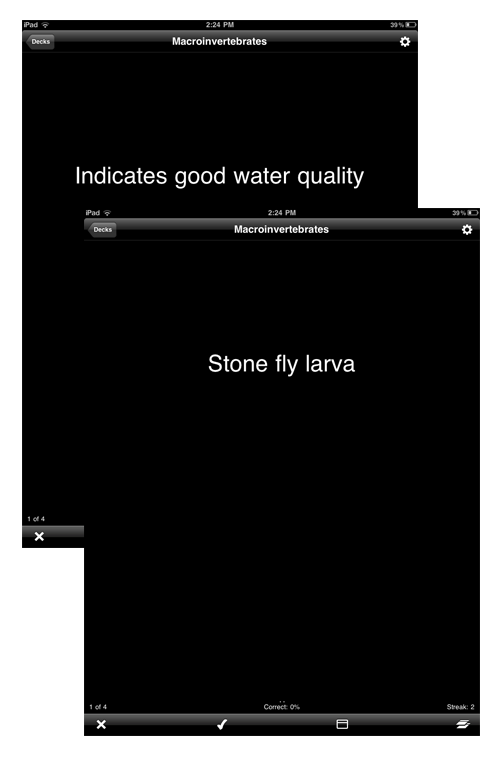
Digital Flashcards (continued)
So, we might begin by asking the question, How might flashcards on the computer, a smartphone, or tablet offer advantages in comparison to the standard paper variety?
We will respond to these question by providing an example of a flashcard application and then considering what unique opportunities this and similar application offer. This examples makes use of Flashcards Deluxe (information about this application and a few other flashcard options appears at the end of this segment); an app for the iPad or iPhone.
Flaschards Deluxe. If you remember the scenario of the Turtle River Water Quality Project we introduced in Chapter 1, you may remember that the prevalence of different macroinvertebrates (organisms without a backbone that can be viewed without aid of a microscope) can be used to evaluate water quality. Some macroinvertebrates can tolerate poor quality water and some cannot. So the collection and identification of macroinvertebrates allows a way to evaluate the “health” of a body of water.
Before making the trip to collect specimens, a teacher might want to prepare students by familiarizing them with the set of organisms they might encounter. This task involves learning to associate the name and whether an organism is tolerant of pollution with an image of the organism. Imagine a three-sided flash card - if there was such a thing. One side might contain an image of the organism, the second side would contain the name of the organism, and the third side would indicate whether the organism was pollution tolerant. If this were possible to create as a physical, paper card, the student would look at a picture, attempt to remember the name and tolerance of the organism, and then flip the card to check the information recalled or view the correct information. The student would then move to the next card and repeat the process.
The digital equivalent, created with Flashcards Deluxe, would work like this. The student would view the image appearing on the first card trying to remember the name of the organism and whether or not the organism is an indicator of healthy water (see Figure Front View). The student would then “tap” the image to flip the card and reveal the name of the organism and would tap the card a second time to reveal whether or not the organism is associated with healthy water (see Figure Composte Feedback). Selecting the “check mark” or “X” appearing at the bottom of the card would indicate whether the student had judged performance to be adequate or not and would move the student to the next image. When the student reached the end of the deck, all cards associated with a judgment of inadequate recall would automatically be repeated.
Front view of Flashcards Deluxe Card

Back views of Flashcards Deluxe Card

What case can be made for the digital version of flashcards? Here are some thoughts on potential advantages. All of these characteristics are available in some products or services, but not necessarily in all so you would want to review the capabilities of a given product before investing a lot of time.
A) Multiple media - Some digital flashcards can incorporate images and sounds (e.g., our example). If the value in multimedia flashcards is not obvious, consider situations in which the study task involves identification of orchestra instruments by the sound the instruments produce, recognition of vocabulary in a foreign language class based on listening rather than reading, or the identification of molecular structures in biochemistry. These would be study situations that would be difficult or impossible to address with paper index cards. You can create multimedia resources yourself. For example, you can collect images with your phone and use these images to create study materials. Would this be useful in preparing for biology or anatomy lab practicals?
B) Existing and shareable review materials - There are massive collections of existing review materials already available for a wide variety of academic areas. There appear to be basic standards or at least common formats for exporting sets of cards so that many of the resources developed through one service can be used on the software provided by other vendors. These collections can be downloaded, combined, and edited by individual students to best address personal study goals. It will often be more efficient to take a large existing collection and delete the cards not appropriate for your class than to create a new stack from scratch. A teacher can do the same thing and then share a set of cards optimized for a specific class with students. We include links to several vendors who store and share collections at the end of this section.
C) Data and suggested review strategies - It might be best to consider what we are describing here as study systems rather than just study materials. In addition to the information to be learned, these systems can keep track of performance on individual items and data such as the last date a given card was reviewed. If the student is so inclined, some systems can present items that cause the student difficulty more frequently or even schedule which content should be reviewed on a particular day within a designated time period. This is where our previous reference to what research can tell us about optimized review and rehearsal comes into play. Computers are good at keeping track of and applying numerical performance data. So, it turns out that free or low cost digital resources offer more than the option of thumbing through the stack of cards you carry in your backpack. If you presently make use of “flashcards” or see such resources as having a use in classrooms that are or will be your responsibility, we encourage you to explore the following resources. We have include some resources that can be used from a computer and some from a tablet.
Resources:
Sites providing repositories of flash cards:
Flashcard products:
Quizlet is an online system you can use with your browser. Study existing stacks or create your own.
Flashcards Deluxe - This application is available for the iPad and iPhone from the Apple App Store. The application was created by OrangeOrApple.
